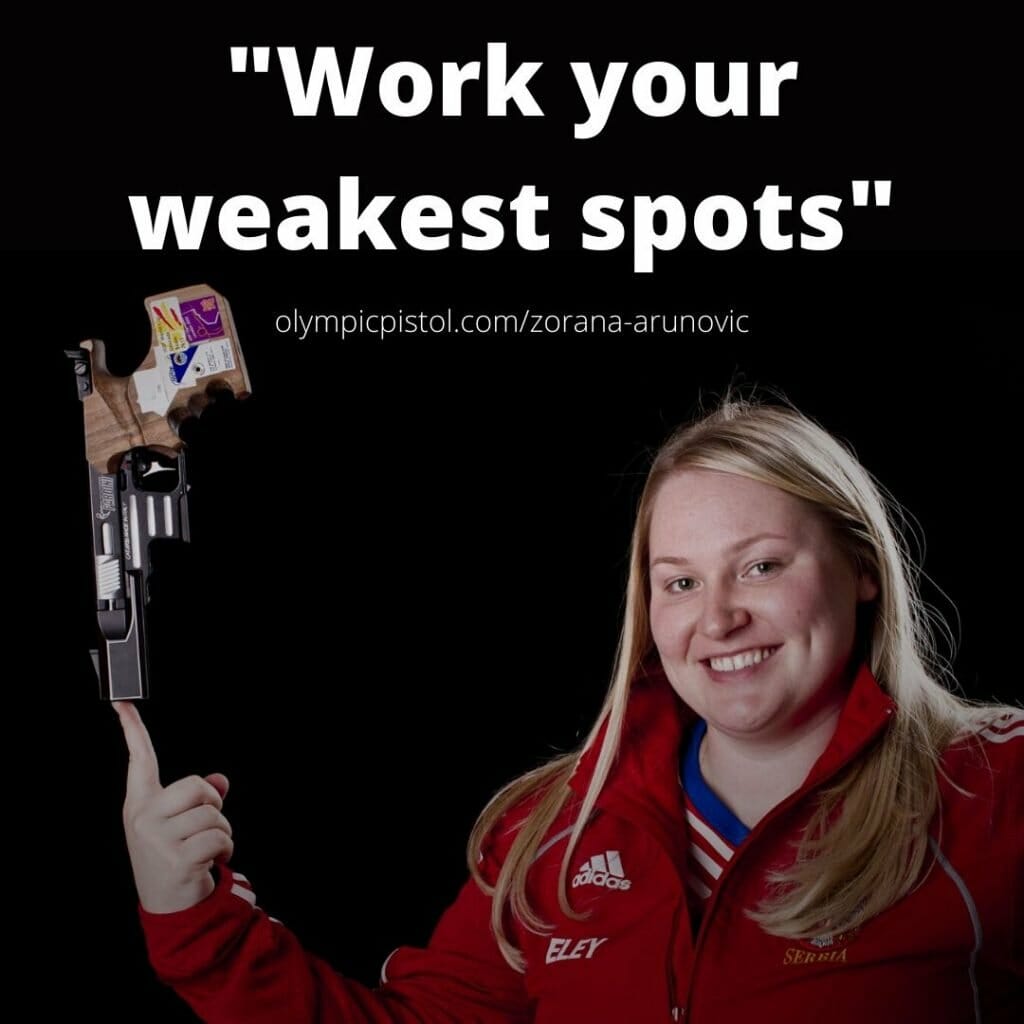Yesterday it was Abhishek Verma, today it is Zorana Arunović that answers. Isn’t this a great start for this series of pistol shooter interviews? 🙂
Zorana Arunović is the current number 1 in the ISSF 10m female pistol ranking. She’s a great pistol shooter and has a personality that brings a lot of joy to the competitions. Her achievements are impressive:
Olympic Games 4th and 7th place
Straight out of Zorana Auronovic’s website, it is worth a visit.
World Championships 5 medals (2-2-1)
European Championships 9 (5-1-3)
World Cups 7 (1-4-2)
World Cup Finals (0-2-0)
Mediterranean Games 3 (2-1-0)
Time for Zorana to do the talking 🙂

Table of Contents
How and when did you start shooting?
I started in 2001, following my sister Jelena‘s footsteps (she’s been my coach since 2010).
What made you want to train and compete more seriously? What was your progression like?
I progressed quickly, and in a short period of time after starting with training I entered the national team and won my first european medal in a team event (Hungary 2004). Because of my quick progress I wanted to see how far I could go. In 2006, four and a half years after my first training, I became European and World champion and that was it for me. It was serious before that, but after that I was sure this was the sphere I wanted to achieve excellence in.
What are you most proud of in your shooting?
I think I am mostly proud of my approach to training and competition, proud of my seriousness and perseverance. I really have a problem giving up. It crosses my mind, but it’s never an option.
What advice has had the biggest positive advice in your shooting? Who gave it?
It’s not something strictly shooting related, but life related in general. Just to keep pushing until the very end, because that’s the only way to be sure you gave 100%. Maybe 100% of that day will be enough for gold, maybe it will be enough for 100th place, but giving up is not an option.
What did you spend a lot of effort on and later discovered it wasn’t so important?
Whoa, on many things. Sometimes I pay so much attention to details and later on realize that’s so not important. I can’t see the forest if I’m looking at the tree.
How do you train and how often? What does a typical training day look like? Do you train with a coach or by yourself?
I have 6 training days per week, sometimes it’s 7, but it’s never less than 6. I always have a coach by my side, which is wonderful.
How do you stay motivated in training and competition?
Well, sometimes it’s very hard to stay motivated when you are going from one competition to another. You basically have no time to fully process and accept your performance in the previous competition and you are already on the way to your next one. It’s difficult, but setting small goals makes things easier.
As for training… well… progress is made in training, not in competition. And you win competitions in training, not only in competitions, if you get me. So, there is no need to be additionally motivated, the idea of improving yourself on a daily basis is enough of motivation.
What do you do before a match or training to get into the appropriate mind space?
I warm up. I make a long warm up with sets of workouts that puts me in the correct mindspace and prepares me for shooting.
How do you manage nervousness through a competition? Can you give an example of inner talk you use when things are not going well?
Oh, it’s better not to give an example of inner talk, it’s not appropriate 🙂 I believe it’s important to find something that works for you, and of course to try it out in training, fully adapt to it in training, work it all the way, and then you can use it in competition. I have my own ways which doesn’t mean that would fit anyone else. It’s important to nourish an individual approach and find what works for each of us.
What aspect of the shooting technique has brought you the biggest improvement? How would you recommend people to train it?
Hmmm… I can’t say it’s only a specific aspect. I believe that improving all aspects of technique gives improvement. Of course, I am going back to the individual aspect here again, because what worked for me doesn’t have to mean it will work for someone else. I always recommend shooters to analyze their technique and see what’s the weakest spot and to work on it.
What would you recommend pistol shooters to focus on improving (technical, mental, physical…)? Can you share one exercise or routine for this? How do you think they should go about it?
Pistol shooters are very often neglecting physical preparation and underestimating the value of proper warmup.
The reason I am stressing this out is the fact I have been one of those who neglected it and ended up with an injury that took me a very long time to heal. I see so many shooters around me having the same issues…
So, pistol shooters, work on your strength, work on your stamina, work on the muscles of your arms, shoulders and stabilizators, just keep getting stronger. The fact that we are not the sport of running and jumping doesn’t mean we don’t have to be strong and keep our body healthy.
I am sorry I didn’t have a proper example of this when I was in my young shooting age because I am sure I would have skipped many physical obstacles, saved a lot of time and gone through many trainings and competitions pain free.
What is your shot routine like?
Prepare for shoot, take a breath, aim, pull the trigger, follow through, prepare for the next shot. Let yourself feel what’s going on with you, let yourself feel if you are ready to take the next shot, try to anticipate if it’s time for break or you can carry on. Listen to yourself and your body, your hands. It takes time, but it’s achievable.
Which tool or equipment can’t you live without ?
Beyond my pistol? 🙂 I think it’s the visor. I feel very very weird without a shooting visor, it’s like part of my body now.
What question would you have liked me to ask and what’s your answer to it?
The importance of a coach in shooting: it is immense!
I see a lot of shooters are trying to coach themselves and I see that as a very bad thing. I know that we, as athletes, know some stuff better than coaches because we learned about it through our own experience, but coaches can see things objectively, and also make plans and lead us.
There are two halves of every team. 50% is the athlete and 50% is the coach. If each of the halfs carries more than 50% then there is no good balance. And we can agree that balance is one of the keys to everything good in life.
Who would you recommend is interviewed next?
Anna Korakaki, Isabella Straub, Jolyn Beer, Sanja Vukasinovic…
Here you can see an World Cup final where all the pressure ended up piling on the last shot against her friend Anna Korakaki. I bet you can see what I mean when I say that Zorana brings joy to shooting 🙂
